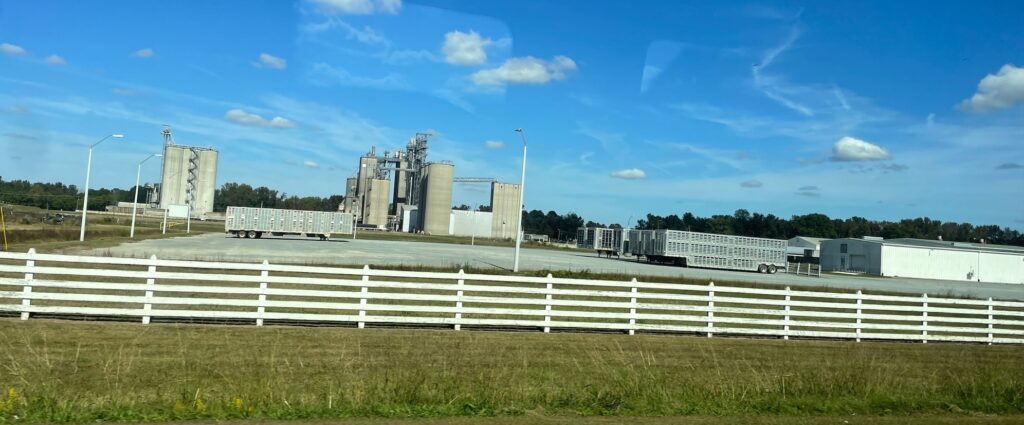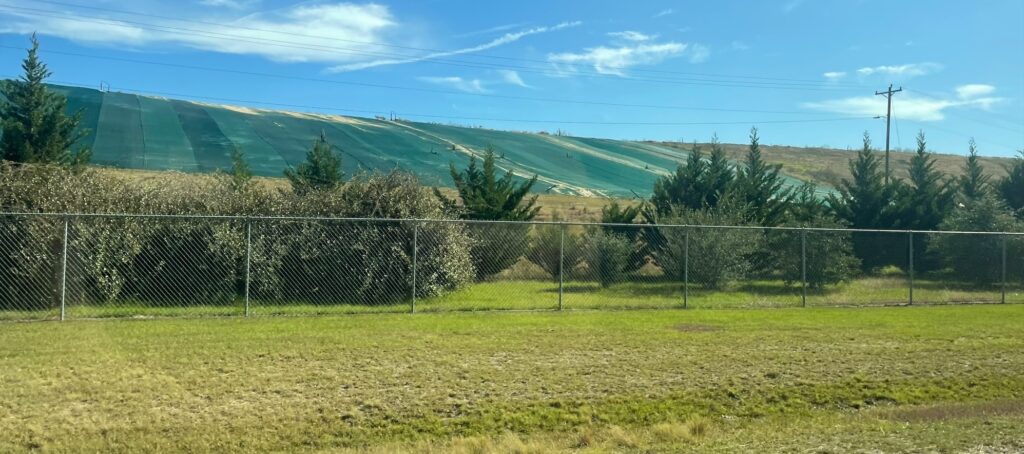“Should I stay or leave?” That is the question that Denise Robinson from the Environmental Justice Community Action Network (EJCAN) leading us through Sampson county asks herself every day. With the smell from the hog waste and landfill a constant presence, and accessing clean water and pure air almost impossible, it is an understandable question. Yet for now, it seems that she and her colleagues are staying, as EJCAN has launched a project testing the water in Sampson county, and monitoring the air quality. A minibus full of DA students toured Sampson County with Sherri White-Williamson, Denise Robinson, and Christian Felipe where we had the opportunity to learn about their work and the context around environmental justice in local government and rural areas.
Seeing where our waste goes and the price that comes with our food can be helpful in steering us towards better actions.
The runoff of hog waste that contains toxic growth hormones and other antibiotics is just one of the reasons that their research so far has only proved that the water in Sampson County is dangerous for its residents. Yet they have to walk an extremely delicate line.
Even if a well is found to be dangerous, residents often avoid reporting it, as they know that residents will not be able to afford to replace it. From the moment we arrived, it was clear that they were fighting an uphill battle: EJCAN’s building itself is extremely close to the factory farm style hog farm and the smell really can not be overstated. Several students commented on the dystopian feeling of the town, with dilapidated houses on one side, and huge, industrial warehouse buildings on the other.

We stopped off at several churches as we toured, talked to some neighbors, and viewed many of the warehouses, as well as the landfill itself. Perhaps one of the most impactful stops was when we drove a few minutes over into the next town where homes immediately started to look a lot nicer, and we learned that the school there actually has access to the clean city water. The mood in the bus shifted to a kind of shock, with many students expressing a surprised but not surprised feeling as we learned more about what caused this situation. Hog farming in North Carolina is extremely unregulated. EJCAN has access to very little information about the processes that actually go on behind closed doors, and the local government has little ability to oversee what actually happens in these plants. The immense landfill in the town is an area where NC could be doing more to protect citizens from its negative health effects. But it hasn’t. Somehow one town has become a hub for both hog farming, poultry farming, and a landfill all at once. As Ms. White-Williamson put it, it is both the bread basket and the dumping ground. I knew that income inequality, racism, and the rural urban divide was deeply connected to this situation, but what I didn’t know was that all of these companies’ potential impacts on the town are reviewed separately and approved in isolation. In other words, approval for the landfill was based on simply measuring the impact of the landfill on the town, not the landfill and hog and poultry farms as a whole. In government everything is isolated, but in lived experience, everything is connected.

It’s easy to look at the town of Clinton and be overwhelmed by negativity, and in many ways I believe that that is an appropriate response. But at the same time, it’s a reminder of what we can do. Local and state elections matter. Looking at candidates for all positions and their history with sustainability directly correlates to their likelihood to use that power to help people like those in Sampson County. Seeing where our waste goes and the price that comes with our food can be helpful in steering us towards better actions. Organizations like EJCAN are working extremely hard to enact change, and they have made incredible progress even now by implementing their testing projects. They are an example of the value of fighting an uphill battle. It was absolutely a privilege to learn from them.
